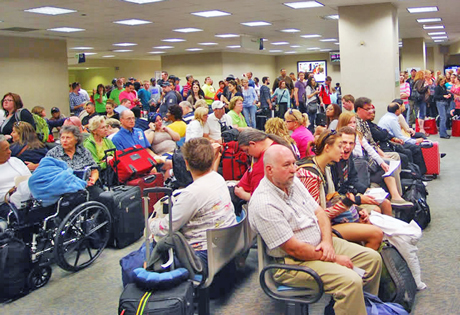Canada
Wait list weakest link in the
healthcare system

By Brian Giesbrecht
Most Canadians think our health-care system is a national treasure and much superior to the American system, where poor people often don’t get the treatments they need and costs can be catastrophic.
Instead of focusing on how Canada’s health-care system compares to America’s, we should be looking at European systems that offer better health outcomes and cost-effectiveness.
We have modern hospitals, competent doctors and nurses, and once you’re in the system, the care given is usually first class.
However, if you’re on one of the many long medical wait lists, our system fails. You can wait a year or more to see some specialists. And, if you wait well over a year for a hip or knee replacement – or for life-saving heart or cancer treatment – our system is far from first class.
Long wait lists alone relegate Canada’s medical system to second-tier status. Even Cubans don’t wait as long as Canadians for certain essential medical services.
Increasingly, desperate Canadians travel to other countries (United States, Mexico, India) and pay big bucks to get procedures done that they can’t get at home within a reasonable time. Some go to patient-pay private clinics in other provinces.
Nearly 400,000 Canadians (including companions) travel outside Canada for health services every year, spending almost $2 million a day. Even politicians jump on a jet and head south for treatment.
Older Canadians who can’t afford to travel bear the brunt of these unconscionable waiting lists. They endure months of pain and some live in terror that the pacemaker, valve replacement or new joint they need won’t be provided before they die.
The provinces should fix the problem but they generally lack the revenue to provide proper services in a reasonable time. Instead, they resort to what can only be described as cruel waiting lists to ration services and control budgets.
So why do the provinces lack the funds to provide timely medical services?
At Confederation, powers were divided between the federal and provincial governments.
The federal government had the most expensive obligations: military, control of national borders, Indigenous relations. As such, it received the main revenue sources. That revenue was greatly augmented when income tax was introduced in 1917, at first as a temporary measure to pay for First World War debts.
Health care was left for the provinces to administer.
In those early decades, health care was much more primitive and much less expensive than today. Religious orders were active in health care, and funding for their hospitals was augmented by fees and donations.
In addition, people didn’t live as long as we now do. Most people died before needing hip replacements and the steadily expanding list of other procedures that now improve the quality of life for seniors.
Medicare is now almost 60 years old. Provinces administer and pay for all hospital and physician services, in part using funds transferred from the federal government.
Costs have increased dramatically as health-care technology improved over the decades.
But the revenue sharing arrangement has not changed, leaving the federal government with a vastly superior ability to extract tax revenue than the provinces.
That means the provinces continually fail to keep pace with health-care needs and costs. As soon as they shorten one waitlist, the demand for new procedures creates another.
The federal government could provide funding to eliminate the disgraceful waiting lists. But no such initiative has taken place.
As a result, Canadians who have faithfully paid their taxes all their lives must sit and wait for care.
If Ottawa can’t step up health transfer payments, it should cede tax points to the provinces.
France, Holland and the Scandinavian countries, among others, have better health outcomes while combining public funding with user fees and premiums. Canadian politicians should acknowledge our system’s failures and begin honest discussions about bringing in some of the proven European practices.
We waste energy focusing on how the flawed American health-care model compares with our model, which has its own flaws. Instead of fixating on such an irrelevant comparison, we should focus on superior European models.
It’s time to introduce reforms to properly fund health care and end unacceptable waiting lists. This will first require an honest look at our failed system.
(Brian Giesbrecht is a retired judge and a senior fellow with the Frontier Centre for Public Policy.)